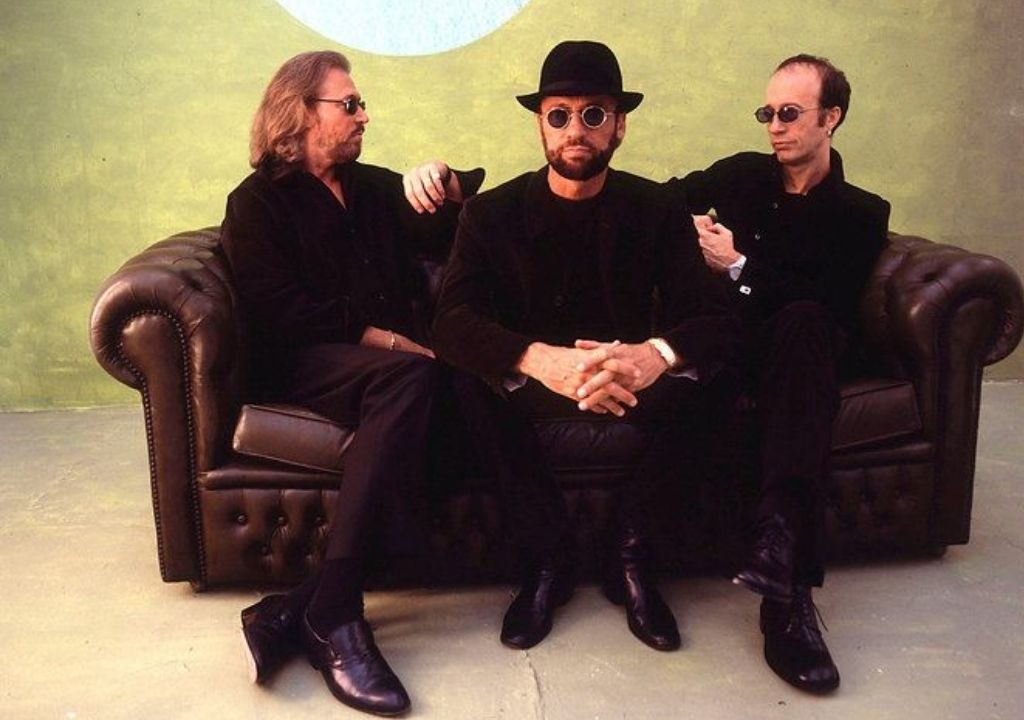
The song “Man in the Middle,” a profound and emotionally charged track from the Bee Gees’ final studio album, transcends being merely another pop song. Released on April 24, 2001, as part of the album This Is Where I Came In, it stands as a compelling artistic statement and a fitting farewell from one of music’s most iconic and influential trios. This song dives deep into themes of personal struggle, identity, and the burdens of public scrutiny, showcasing a return to the Bee Gees’ melodic pop-rock and ballad roots, in stark contrast to their disco anthems that dominated the 1970s. Serving as a soulful and introspective centerpiece of their last album, Man in the Middle holds a unique, somber weight that underscores the bittersweet culmination of a remarkable five-decade-long career.
By the time the Bee Gees unveiled This Is Where I Came In, their legacy was already cemented, with record sales estimated between 120 million and 250 million worldwide, securing their spot among the best-selling music artists in history. They had successfully navigated major transformations in the music industry—shifting from 1960s psychedelic pop to becoming disco icons in the 1970s—and were inducted into the Rock and Roll Hall of Fame in 1997. After a substantial hiatus, the album marked a fresh beginning and a reconciliation between their past and present sounds. The Bee Gees themselves described the project as a “return to the original Bee Gees formula,” stepping back from the experimental electronic textures that punctuated some of their later works. Within this environment, “Man in the Middle” emerged as a significant piece, especially notable for being the only track on the album featuring lead vocals by Maurice Gibb—a lead whose earnest and warm voice provided a deeply emotional core to the song, just before his untimely passing less than two years later.
“Maurice poured his heart into that song. You can hear his soul in every note,” said Barry Gibb, the eldest brother and key vocalist of the Bee Gees, reflecting on the unique place *Man in the Middle* occupies in their catalog.
Musically, “Man in the Middle” fits comfortably into the soft rock and adult contemporary genres, pairing accessible pop melodies with mature and introspective lyricism. Unlike the danceable grooves or soaring falsettos the Bee Gees were known for, this song steers toward aMid-tempo rhythm paired with soulful vocal delivery, conveying a raw and weary honesty. Maurice’s vocals render the song’s themes—being caught amid forces beyond control—with powerful emotional resonance. The instrumentation is characteristic of the Bee Gees’ signature style, featuring rich harmonies and meticulous arrangements that enhance the song’s storytelling without overshadowing it. Critics praised the album as a triumphant and fitting finale to the group’s career, with Man in the Middle emerging as a standout track for fans. Its lyrical exploration of regret, self-awareness, and the complexities of human experience strikes a universal chord, exemplifying the Bee Gees’ enduring gift for poignant songwriting.
“Listening to *Man in the Middle* feels like hearing Maurice’s final heartfelt message to us all,” shared Jenna Collins, a longtime Bee Gees fan and founder of a major fan community. “It’s his musical farewell, rich in meaning and emotion.”
Though it was never released as a single and thus never entered traditional music charts, the song’s impact resonates strongly in a quieter yet profound way. With the advent of digital music platforms, “Man in the Middle” has been rediscovered and cherished, particularly gaining a devoted following on fan-curated playlists and video-sharing platforms like YouTube. It is frequently spotlighted in conversations about Maurice Gibb’s unique vocal contributions and his distinct musical identity within the trio. To many admirers, the track’s legacy is a deeply personal and emotional symbol—the last lead vocal Maurice recorded for the Bee Gees on a studio album, making it a sacred tribute embedded forever in the band’s musical narrative.
“Maurice was the heart of the group in so many ways. *Man in the Middle* stands as a touching reminder of his talent and character,” explained Dr. Raymond Fitzpatrick, music historian and expert on 20th-century pop music.
Ultimately, the achievement of Man in the Middle lies not in commercial triumphs or chart success but in its enduring ability to connect with listeners on a profound human level. It resonates as a powerful final statement from the “man in the middle” himself—a testament to the Bee Gees’ extraordinary longevity and their timeless capacity to craft music that moves and inspires, even at the closing stages of their legendary journey.